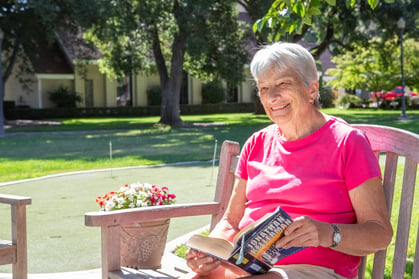Larry Dawes is an Eskaton guest blogger and the gerontological social services specialist at Eskaton Support Center. As part of the community outreach team, he provides education and training for staff and residents across the region.
Wisdom is an extraordinary gift that allows us to reflect on our lives, learn from our accomplishments and mistakes, and assists in making future decisions and judgments. Wisdom can't be touched, tasted, or seen, but it can be experienced and learned. It is this experience that becomes the foundation of who we are and how we respond to challenging times. With such a valuable decision-making tool at our disposal, it’s important to take the time to develop it so it can be used as effectively as possible.
Here are five strategies to help you enhance your own wisdom:

#1 – Observe and learn: Also known as the “park bench approach,” observing the behaviors and decisions of others can teach us a lot about what works and what doesn’t. We don’t always have to experience something for ourselves – we can become wiser by simply learning from the actions and choices of other people.
#2 – Develop problem-solving skills: If you've ever watched a baby trying to stand for the first time, you know they have to make multiple attempts, often getting frustrated and crying until that moment of success. In order to develop wisdom and move forward in life, we must apply critical thinking and problem-solving skills, just like the baby did. And once we learn to “pick ourselves up,” similar challenges are much easier to overcome.
#3 – Understanding consequences: Have you ever forgotten to securely place the lid on your travel mug full of coffee? You pour your coffee into the mug, slap the lid on top, and the first time you hit a bump or move too fast, you’ve got hot coffee all over you. You now understand the consequences of failing to secure the lid and you’re not likely to make the same mistake again. Even though the consequences might “sting” a bit, you’ve learned something from the experience, and gained wisdom in the process.

#4 – Know your values and priorities: As human beings, we all have experiences that help us to understand who we are and what matters most to us. Experiences that establish our values and priorities also increase our level of wisdom, as they teach us what is vital to our contentment and sense of emotional security.
#5 - Recognizing and managing uncertainty: n recent years, our country has experienced several significant weather, social, and public health concerns, including the recent and unprecedented California wildfires. Despite the overall negative nature of their experience, those individuals affected by the fires have learned to manage the uncertainty of life and acknowledge that “this too shall pass.” This learning process, while painful, can also have the positive effect of increasing wisdom.
We hope these 5 tips on increasing your personal wisdom was helpful. For more information on how to improve your emotional health and well-being, visit our Wellness 101 resource page on Eskaton’s website.

